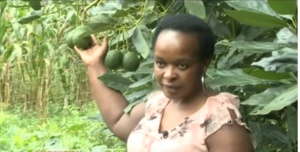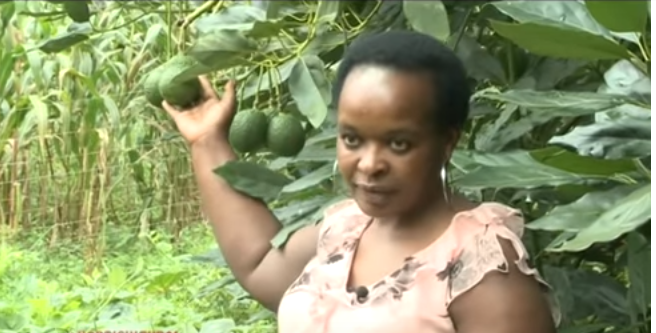
Ann Wangechi Photo ( Courtesy Of Farmbizafrica)
Anne Wangechi, an avocado farmer in Murang’a County, earns KES 70,000 every harvest from the crop, which has been dubbed “new gold” for Kenyan farmers who have given up coffee cultivation due to its labour intensiveness and low market value.
When she finished her secretarial degree and couldn’t find work, her mother-in-law gave her a piece of land that belonged to the family and already had coffee and banana plants. She didn’t enjoy producing coffee since it was difficult and time-consuming, and the marketing procedure was also inconvenient.
She claims that her first earnings selling coffee were KES10,000. This seemed little in comparison to the expenses of production to her. It was at this time that she began persuading her mother-in-law to let her remove all of the coffee bushes and replace them with a more profitable crop like macadamia nuts or avocados.
This was difficult, however, because the family had relied on coffee as their primary source of income and funding for their children’s education. After much persuasion, she was able to persuade her mother and husband to let her try her luck.
The young couples then relocated to Nairobi in search of work. Wangechi was fortunate enough to find a secretarial position with a firm that paid her Sh35,000 per month. She returned home and killed all the coffee plants and a few bananas to make space for the next crop after saving some of the money for a while.
She then paid KES 10,000 on Hass avocado seedlings from a neighbouring Kenya Agricultural and Animal Research Organisation (KALRO) branch and acquired livestock manure for planting from surrounding families.
She planted over 100 saplings, but due to a drought that hit shortly after planting, she was left with only 70 trees, which she had to replenish.
The farmer expected KES 46,000, however, a lot of fruits were rejected during a quality inspection by an export business owing to post-harvest mismanagement. She was obliged to sell the rejected fruits at Sh6 apiece at the local market.
She collects roughly 30,000 fruits every season, selling each for KES11, totalling KES 330,000 in a season. However, some fruits are damaged during harvesting and transportation, resulting in some losses.
“It’s impossible to be flawless. Though I was able to put certain safeguards in place to prevent losses, some are unavoidable.”







